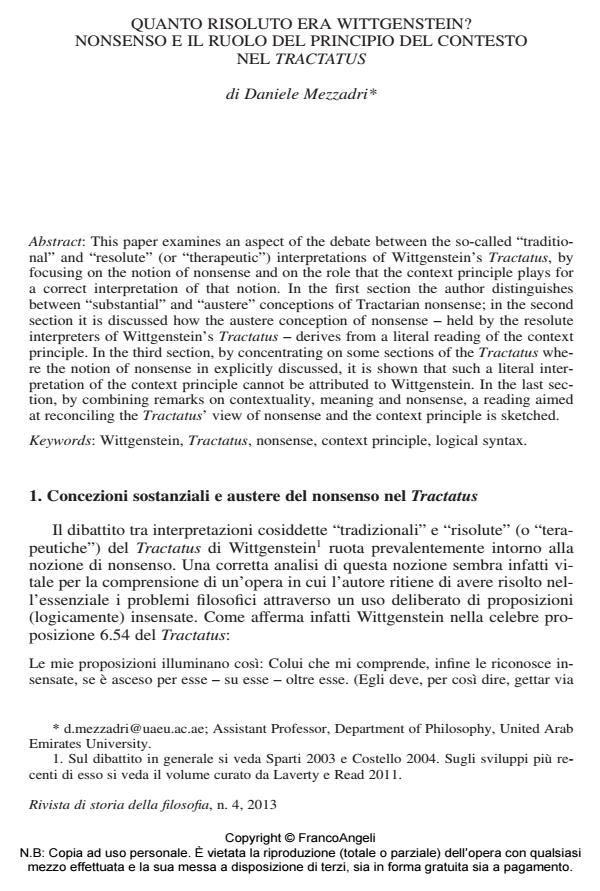Quanto risoluto era Wittgenstein? Nonsenso e il ruolo del principio del contesto nel Tractatus
Titolo Rivista RIVISTA DI STORIA DELLA FILOSOFIA
Autori/Curatori Daniele Mezzadri
Anno di pubblicazione 2013 Fascicolo 2013/4
Lingua Italiano Numero pagine 17 P. 721-737 Dimensione file 495 KB
DOI 10.3280/SF2013-004004
Il DOI è il codice a barre della proprietà intellettuale: per saperne di più
clicca qui
Qui sotto puoi vedere in anteprima la prima pagina di questo articolo.
Se questo articolo ti interessa, lo puoi acquistare (e scaricare in formato pdf) seguendo le facili indicazioni per acquistare il download credit. Acquista Download Credits per scaricare questo Articolo in formato PDF

FrancoAngeli è membro della Publishers International Linking Association, Inc (PILA), associazione indipendente e non profit per facilitare (attraverso i servizi tecnologici implementati da CrossRef.org) l’accesso degli studiosi ai contenuti digitali nelle pubblicazioni professionali e scientifiche.
This paper examines an aspect of the debate between the so-called "traditional" and "resolute" (or "therapeutic") interpretations of Wittgenstein’s Tractatus, by focusing on the notion of nonsense and on the role that the context principle plays for a correct interpretation of that notion. In the first section the author distinguishes between "substantial" and "austere" conceptions of Tractarian nonsense; in the second section it is discussed how the austere conception of nonsense - held by the resolute interpreters of Wittgenstein’s Tractatus - derives from a literal reading of the context principle. In the third section, by concentrating on some sections of the Tractatus where the notion of nonsense in explicitly discussed, it is shown that such a literal interpretation of the context principle cannot be attributed to Wittgenstein. In the last section, by combining remarks on contextuality, meaning and nonsense, a reading aimed at reconciling the Tractatus’ view of nonsense and the context principle is sketched.
Parole chiave:Wittgenstein, Tractatus, nonsense, context principle, logical syntax.
Daniele Mezzadri, Quanto risoluto era Wittgenstein? Nonsenso e il ruolo del principio del contesto nel Tractatus in "RIVISTA DI STORIA DELLA FILOSOFIA" 4/2013, pp 721-737, DOI: 10.3280/SF2013-004004